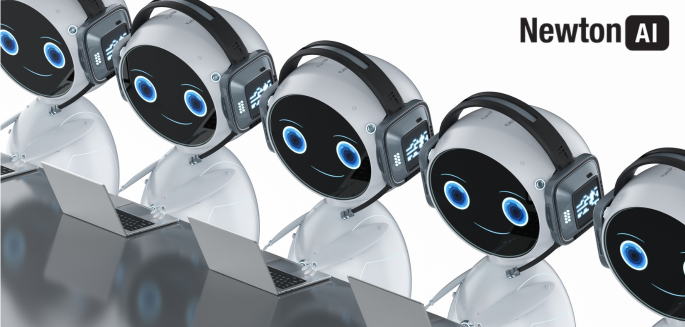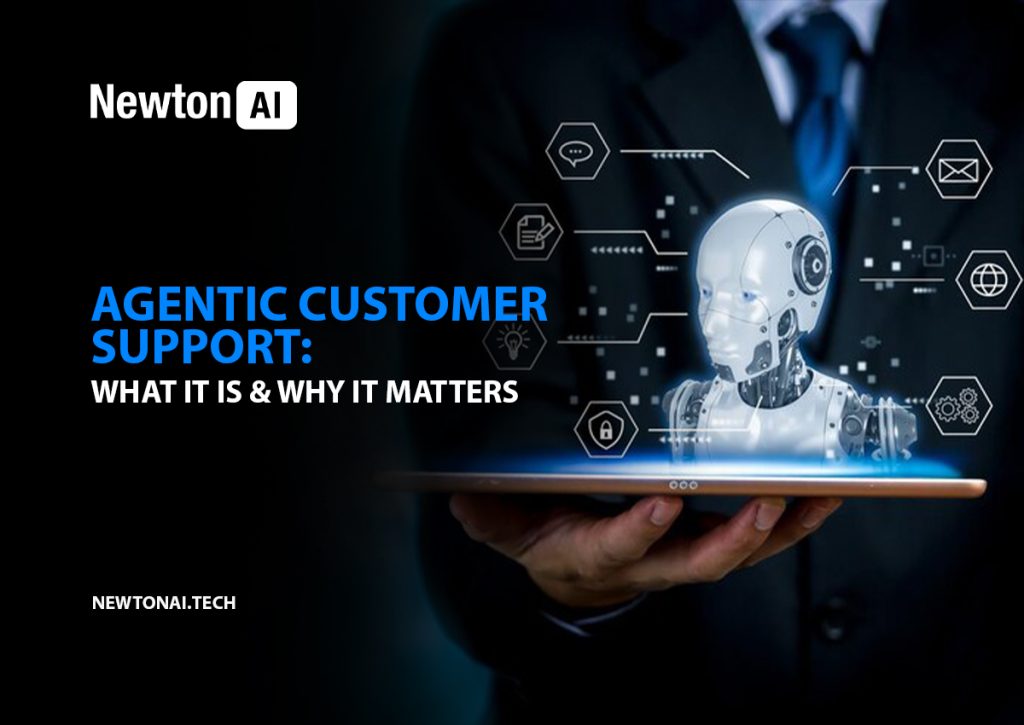As digitalization has advanced significantly within modern-day corporate affairs, outgrowing the traditional customer support has got on the most rapid edges, and having optimal interactions has become increasingly un-tails or needs compared to traditional customer service modes. This has introduced Agentic Customer Support: a conceptual model of autonomy-based principles, flexibility, and a proactive response to problem issues, which we will discuss in this blog-what it is, how it helps, in short, why it is the game-changer for any business trying to boost customer satisfaction and better operational efficiency.

Understanding Agentic Customer Support: Empowering Agents, Elevating Experiences
In an ever-evolving landscape of corporate organization, customer support cannot only be that responding to inquiries-it has to become, more than anything else, proactive, meaningful interaction. Hence, Agentic Customer Support, born out of this change, is an innovative concept that empowers support agents to take actions, reach decisions, and deliver unique experiences by not merely solving problems.
What Is Agentic Customer Support?
The real essence of Agentic Customer Support is empowering customer service agents with autonomy, and tools such that, instead of merely acting as order-takers, they can actually act as problem-solvers. As opposed to traditional models of support wherein agents follow prescript codes, critical thinking, empathy and proactivity are fed in the model of agentic support. Agentic Customer Support are thus enabled to predict what may be needed by customers, recommend options and preventive actions that would enhance overall customer experience.
Why Is It Important?
The traditional reactive model often leads to frustrated customers and disengaged agents. In contrast, agentic customer support fosters:
-
- Higher Customer Satisfaction: Proactive agents can resolve issues faster and more effectively.
-
- Increased Employee Engagement: Empowered agents feel more valued and motivated.
-
- Stronger Brand Loyalty: Customers appreciate brands that understand and anticipate their needs.
How Does It Work?
Agentic support includes both the human intuition and smart technology. For example, all AI-powered insights, real-time data analysis, and advanced CRM systems provide the base for making decisions by agents. The human element, though, is critical. The Agentic Customer Support apply their judgment, emotional intelligence, and best practices in connecting with each customer as authentically as possible.
Key Elements of Agentic Customer Support:
-
- Empowerment: Giving agents the authority to make decisions without constant supervision.
-
- Autonomy: Allowing agents to manage interactions in ways that feel natural and responsive.
-
- Proactivity: Encouraging agents to anticipate customer needs before issues arise.
-
- Continuous Learning: Providing ongoing training to enhance problem-solving skills.
The Impact on Businesses
Organizations providing customer service based on this agentic model for customer support notice a consistent positive chain with the customers feeling heard and valued. Therefore, organizations enjoy reduced churn, increased customer lifetime value, and a more engaged and satisfied workforce.
It is true that agentic customer support goes much beyond trends; it is a whole strategic transformation of how businesses engage their customers. So, Agentic Customer Support empowerment drives building memorable, meaningful experiences that translate into loyalty and growth.

Key Characteristics of Autonomous Service Solutions
Bringing about a whole new form of customer service, an agentic model becomes for the agents within the organization the asymmetric provision for proactive, personalized, and effective support. Unlike conventional reactive models, agentic support empowers, capitalizes, and allows for emotional intelligence and employs data to make the decisions that would matter to the customer. Below are the main characteristics of this new model of customer support.
1. Empowerment and Autonomy
The agentic paradigm for customer support puts empowerment front and canter in the perspective of agents. A support team does not live by the shackles of an inflexible script with a hard-core set of rules; it frees them to take suitable decisions, come up with creative ways of solving problems, and immediately answer customer needs. Such freedom fosters a sense of ownership and accountability in the employee, leading to more genuine and stronger customer conversations.
2. Proactive Engagement
Agentic support strives to respond, but it also seeks to prevent unaddressed or unacknowledged issues from snowballing out of control. Agents will reach out pre-emptively to customers with solutions derived via predictive insights and create more moments that will delight customers. This is an approach that reinforces relationships and relieves frustration among customers.
3. Personalization
One hallmark of agentic customer support is personalization. When interacting with clients, agents access customer information, thus being able to customize their handling of the exchanges on specific customer preferences, purchases, and past experiences. Such personalized support ensures that the customer feels appreciated, listened to, and understood, and will increase satisfaction and loyalty.
4. Emotional Intelligence and Empathy
Even if it is technology that drives agentic customer service, the human element is still very important. Agents learn to apply emotional intelligence: that is creating empathy to the emotions of the customer, and then develop trust and rapport. Such empathy works magic at de-escalating and nurturing positive, memorable experiences.
5. Data-Driven Decision Making
Here’s what you’ll find: data-driven insights that agentic customer support relies on-they use real-time analytics agents to understand customer behaviour and predict needs from that wonderful magic word data-and make informed decisions. Thus, the entire concept enriches efficiency and ensures that the support given is appropriate, timely, and effective.
6. Continuous Learning and Adaptability
Dynamic agentic support forces agents into flexibility and a learning mind-set. Regular training, feedback loops, and knowledge-sharing practices ensure they access the latest findings in new technology, customer trends, and best practices, enhancing high-quality support all the time.
7. Collaboration and Team Support
Dynamic agentic support forces agents into flexibility and learning. Regular training, feedback loops, and knowledge-sharing practices keep the agents updated on new technologies, customer trends, and best practices to ensure high-quality support always.

The Role of AI in Agentic Customer Support
The world of customer support is undergoing a sweeping AI revolution, fundamentally increasing the effectiveness and efficiency of agentic customer care. These include automating mundane activities, offering data-backed insights, and providing support agents with on-the-spot information, so businesses can offer a more customized, proactive, and responsive customer experience.
1. Automating Routine Tasks
AI automating those monotonous and time-consuming tasks is among the most important things it does for agentic customer support. AI-based chat-bots and virtual assistants can respond without human intervention to common questions, hence processing transactions and carrying out basic technical support tasks. This frees up the time of support agents, allowing them to concentrate on serious issues that require a certain degree of emotional intelligence, critical thinking, and problem-solving skills.
2. Enhancing Personalization
Hyper-personalization of customer interactions is made possible through AI-powered platforms that sift through vast amounts of customer data: customer preferences, purchase history, and past interactions. The brainy approach then allows agents to give tailored recommendations, foresee customer needs, and push forward solutions relevant to each customer. This level of personalization helped forge the relationship and fostered loyalty.
3. Real-Time Data Insights
AI-driven analytics tools give support agents real-time insights into customer behaviors, sentiments, and service trends. These insights not only help agents make informed decisions but also help them anticipate issues and address customer concerns in a timely manner. Additionally, real-time data assists in unveiling patterns that will in turn tend to enhance overall service quality.
4. Empowering Agents with Decision Support
AI acts as an intelligent assistant for support agents, suggesting them during customer interaction with the help and knowledge-based articles and the helpful solution. This entire concept works as a decision support system that diminishes the cognitive load on agents so they can respond faster and accurately with service quality.
5. Predictive Customer Support
AI enables businesses to predict the problems their customers could be facing before the aggrieved people even arrived on the scene. Empirical analysis of past data sets and identification of patterns have helped AI be there in time for agents to know the circumstances prompting proactive outreach to customers. This proactive strategy has resulted in enhanced customer satisfaction and declining churn rate.
6. Enhancing Omni channel Support
AI seamlessly weaves itself across email, chat, social media, and voice support to deliver a consistent and cohesive customer experience. This, in turn, gives agents a unified profile and support history of the customer, bringing continuity and context through the various touchpoints.
7. Continuous Learning and Improvement
AI is a continuous learner from customer interaction to self-improvement. The algorithms examine what happened during the interaction and analyze customer feedback to suggest improvements to AI-embedded solutions with the format of service delivery.

Why Agentic Customer Support Matters?
The highest customer satisfaction level prevailed among businesses which means that it has deemed mandatory to revamp the customer-support strategy of a business for any competition worth it. The new approach to Customer Support is called Agentic Customer Support, in which the shift is from the traditional reactive aspects to proactive, personalized, and empowered interactions with customers; then, that should be enough. But stand to hear if it is at all actually important. So, why should agentic customer support be for modern businesses?
1. Enhances Customer Satisfaction
Put simply, agentic customer support redefines odd customer experience management as an organ towards delivering management of customers of their experiences. Creating room for those agents being empowered as decision-makers – awaiting needs, engaging proactively with – creates important characters around clients while speeding up problem perception and resolution, personal connectivity of interaction, as well as the emotional bond toward the customer with all these elements making a positive contribution to the overall satisfaction and loyalty of the customer.
2. Empowers Support Agents
Most agents will end up feeling like order takers not just because they’re, as mentioned, taking the orders themselves but because the lines of inquiry or script they’re following deny them a chance to add creativity and style to the support roles they are assigned. Everything that the customer believes the agent can do will be done in such an environment. Unlike standard support channels, agentic customer support allows agents to solve their problems using creative means. It empowers agency so employees feel they are valued, engaged, and motivated and make a difference when it comes to job satisfaction and performance.
3. Drives Business Growth
The happy customers are bound to repeat along with being advocates of the brand. As different businesses leverage an agentic support system, the percentage of loyal customer retention increases and eventually leads to algorithmic positivity in word-of-mouth referrals which directly contributes to revenue, brand reputation, and entire business future growth.
4. Fosters Proactive Problem Solving
This kind of support frees agent interaction from being reactive, as is typical of most delayed-fix customer services. It predicts possible issues and blocks any minor issues from bubbling to the surface, coming up with solutions in advance for potential sources of aggravation before the customer even comes. It helps state the customer – even before the occurrence of a minor glitch-with a little or even completely less incidence of needing repeated support contacts.
5. Personalizes the Customer Experience
All support in agents is personalized. Agents have access to the customer means; in turn, they can personalize interactions to fit the individual’s preference, past behavior, and wants. Such personalization makes customers feel understood and appreciated, hence better experience with the brand.
6. Improves Efficiency and Reduces Costs
This exercise-free agent goes a step further in exercising judgment and independent resolution of issues, that is reducing the dependency on supervision and escalation for the most part. This invokes quicker resolution time, lesser operational cost, and better resource allocation.
7. Builds Stronger Brand Relationships
It is another type of customer support-agency that focuses on developing relationships and not on mere transactions. When such efforts are channelized towards hearing, appreciating, and supporting the customers, dwarfed by emotional loyalty, these transactions will always be greater than satisfaction at this plane, opening up a path to long-term success.

Implementing Agentic Customer Support in Your Business
Exceptional customer support in the present competitive world is much more than a differentiating factor; it is now a vital aspect of business. Agentic customer support allows support agents to take charge, solve problems proactively, and create uniquely personalized customer experiences. Successful implementation is obviously a task for any business. Here is a step-by-step guide to implement such a system.
1. Define Clear Objectives
Before you start implementing, set distinct objectives for what you want to attain in agentic customer support. Do you want to improve customer satisfaction? Drop churn rates? Raise agent performance? Drive efficiency? These definitions will help you craft your strategy toward successful measurement.
2. Empower Your Support Agents
The heart of agentic support is agent empowerment. Provide your agents with the autonomy to make decisions without constant supervision. This doesn’t mean removing guidelines altogether—rather, it’s about giving agents the flexibility to handle customer issues in ways that make the most sense for the situation. Encourage a culture of trust, where agents feel confident in their ability to problem-solve.
3. Invest in the Right Tools and Technology
For agentic customer support, one should invest in tools that provide real-time data, customer insights, and decision-support systems: CRM, AI-driven analytics, knowledge bases, among others, can help agents quickly decide about the right course of action. Also, robots can take care of mundane things, allowing humans to spend their time on intricate tasks.
4. Focus on Training and Development
Continuous learning is at the core of successful agentic support. Training should not at all be limited to technical issues but would instead involve emotional intelligence, critical and creative thinking, and problem-solving methods. It is important that your agents will be imparted with the relevant knowledge to carry out customer service tasks independently.
5. Foster a Proactive Mindset
Transitioning the support team from reactive to a proactive approach is important. This proactive service means assessing the customers’ needs, raising potential problems before they intensify and contacting customers with solutions before they ask. The potential for building customer relationships is strengthened through proactive support, whereas the volume of incoming issues is lessened.
6. Monitor, Measure, and Optimize
Establish performance metrics to gauge how successful your support has been in becoming agentic. Parameters such as customer satisfaction scores (CSAT), Net Promoter Score (NPS), first-contact resolution rate, and agent productivity are key metrics in this regard. Use this data to make improvements and constantly adjust your Agentic AI .
7. Create a Culture of Empowerment
Finally, promote a corporate culture that fosters autonomy and accountability, and develops customer-centric thinking. Celebrate and reward agents excelling at agentic support, and encourage open cooperation and knowledge sharing across teams.

The Future of Agentic Customer Support
Ever-increasing technology advancement, changing customer preferences, and the growing need for personalized and proactive customer service will bring about a complete transformation in the coming years, for Agentic Customer Support. The businesses will continue evolving and, with them, the techniques of making a connection or contact with customers. Here is what the future says about agentic customer support:
1. AI and Automation at the Core
AI will play an even more major role in agentic customer support. AI-enabled tools will take care of routine tasks, then equip the agent to make decisions based on real-time monitors, predictive analytics, and personalized recommendations. All this will allow agents to focus on those more complicated issues, which require a degree of tolerance, creativity, and critical thinking.
2. Hyper-Personalization Through Data
The personalized futures will come in much deeper. Advanced data analytics will allow the support agent to go much deeper into customer insight and predict needs on the spot, so he can offer a tailor-made real-time solution. This approach gives rise to deeper ties, creating more loyal customers.
3. Omni channel Integration
These consumers expect consistent and smooth experiences from all fronts: from chat, to email, to social media, and even voice. The future of agentic customer support will include coherent and better omni channel strategies for customers so that whichever platform the customer is using, he will be given support that is consistent and makes sense of the context. For instance, agents will find it easy to take up conversations across channels, thanks to AI-integrated solutions.
4. Proactive Customer Engagement
Agentic support will further slide toward proving preemptive service. The predictive analytics will answer that question even before the matter arises, thus opening the way for companies to proactively reach out to their customers for a planned resolution. Here, customer frustration is lowered, and customer satisfaction improves.
5. Continuous Learning and Adaptability
The roles and skills of support agents will change in accordance with new customer expectations. Continuous AI-facilitated training sessions and comprehensive real-time feedback mechanisms will ensure the agents are equipped and ready to tackle the new challenges emerging in their jobs.
Final Thoughts
Autonomous Service Solutions is very much a preview into the future—the future for customer service. Organizations that are able to adopt this into their framework will more likely see their customers benefiting from better experiences, greater efficiency, and loyalty toward the brand. While gaining an edge over the competition, businesses will also help customers have a positive touch with innovation through the effects of integrated AI-powered technologies from Newton AI Tech.
Do you want to introduce an agentic approach to transform customer support? If yes, then you should consider Newton AI Tech solutions for your organization.

